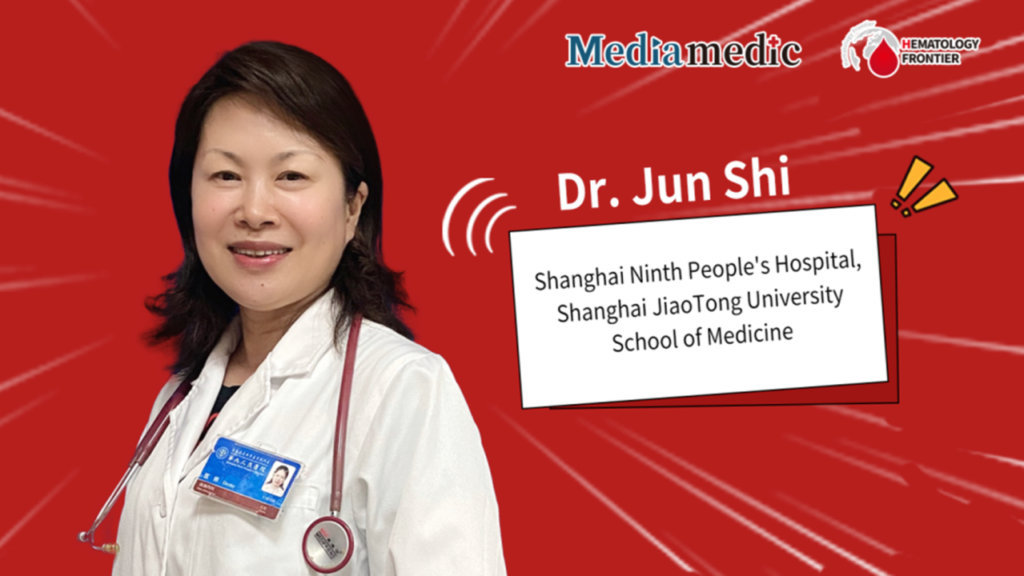
Editor's Note: While radiotherapy is the recommended first-line treatment for mucosa-associated lymphoid tissue (MALT) lymphoma, for certain non-gastric MALT lymphomas in specific locations, radiotherapy may result in significant side effects that can affect patients' quality of life. Recently, the "2024 Northern Hematology and Oncology Immunotherapy Conference," hosted by the Tianjin Society of Hematology and Regenerative Medicine, was held grandly in the northern coastal city of Tianjin. The conference brought together renowned hematology experts from across the country, focusing on the immunotherapy of hematologic malignancies. They explored the latest advances in the diagnosis and treatment of various hematologic sub-specialties, the pathogenesis of hematologic tumors, and progress in immunotherapy. At the conference, Dr. Jun Shi from Shanghai Ninth People's Hospital, Shanghai JiaoTong University School of Medicine, delivered an insightful presentation titled "Treatment Options for Localized Non-Gastric MALT Lymphoma," offering valuable guidance for optimizing the treatment of this disease. Hematology Frontier invited Dr. Jun Shi to further discuss this topic.Hematology Frontier: In your presentation at the conference, you discussed “Treatment Options for Non-Gastric MALT Lymphoma.” Could you first explain how the treatment and prognosis of non-gastric MALT lymphoma differ from gastric MALT lymphoma or other types of lymphomas? What are the unique characteristics of non-gastric MALT lymphoma?
Dr. Jun Shi: Mucosa-associated lymphoid tissue (MALT) lymphoma is classified into gastric MALT and non-gastric MALT lymphomas. Unlike gastric MALT lymphoma, which is confined to the stomach, non-gastric MALT lymphoma can occur in various locations, such as the ocular adnexa, thyroid, parotid gland, thymus, lungs, and skin. Both gastric and non-gastric MALT lymphomas are types of marginal zone lymphomas, so their prognoses are similar. However, their patterns of recurrence, especially distant recurrence, differ. Non-gastric MALT lymphoma is more likely to metastasize to other sites beyond the primary location, whereas gastric MALT lymphoma tends to recur locally in the stomach or nearby, with distant metastasis being rare. Despite these differences in recurrence patterns, both types generally have a good prognosis, and patients tend to have long survival times.
Hematology Frontier: What are the current treatment options for non-gastric MALT lymphoma? What role does immunotherapy play in these treatments? How should treatment plans be tailored based on the specific circumstances of each patient?
Dr. Jun Shi: Radiotherapy is the primary treatment for non-gastric MALT lymphoma, but its side effects vary depending on the location of the disease. For example, ocular adnexal MALT lymphoma is highly sensitive to radiotherapy, but there is a risk of long-term complications. If treated with the standard radiotherapy dose of 30 Gy, patients may develop cataracts or dry eye syndrome later in life, which can negatively impact their quality of life. Similarly, parotid gland MALT lymphoma often occurs secondary to Sjögren’s syndrome, and radiotherapy for the gland is generally not recommended, even though this site is also sensitive to radiotherapy. Therefore, for certain non-gastric MALT lymphomas in specific locations, although radiotherapy is recommended as first-line treatment, there is an ongoing effort to reduce the radiotherapy dose or even avoid radiotherapy altogether.
In cases involving autoimmune diseases, such as those affecting the parotid or thyroid glands, immunotherapy may be necessary even in the absence of MALT lymphoma. For MALT lymphomas associated with autoimmune diseases, immunotherapy can treat both the lymphoma and the underlying autoimmune condition, offering significant benefits. Additionally, regardless of the location of the MALT lymphoma, treatment should be individualized based on the extent of the disease and the stage of the illness. For patients with localized disease, a “watch and wait” approach may be appropriate, or treatment may be selected based on the sensitivity to radiotherapy and the potential long-term side effects, including the choice of radiotherapy or immuno-targeted therapies.
Hematology Frontier: In your view, what unmet needs still exist in the diagnosis and treatment of non-gastric MALT lymphoma, and what areas should future efforts focus on to further improve treatment outcomes and survival rates for these patients?
Dr. Jun Shi: As mentioned earlier, radiotherapy is the recommended first-line treatment for non-gastric MALT lymphoma. However, for non-gastric MALT lymphomas located in the ocular adnexa, parotid gland, thyroid, and other special sites, radiotherapy can lead to short- and long-term complications, impacting patients’ quality of life. Therefore, it is crucial to explore new treatment approaches for these non-gastric MALT lymphomas, including immunotherapy and targeted therapies such as CD20 monoclonal antibodies, Bruton’s tyrosine kinase (BTK) inhibitors, and drugs that can block the nuclear factor-κB (NF-κB) signaling pathway. These drugs not only treat lymphoma but also have the potential to improve the underlying autoimmune disease, providing a dual benefit.
Dr. Jun Shi
- Director of the Hematology Department at Shanghai Ninth People’s Hospital, Shanghai JiaoTong University School of Medicine
- Medical Doctor, Chief Physician, and PhD Supervisor, trained in Japan
- Vice President of the Internal Medicine Branch of the Shanghai Medical Doctor Association
- Vice President of the Hematology Branch of the Shanghai Medical Doctor Association
- Deputy Director of the Hematology Branch of the Shanghai Society of Integrative Medicine
- Main clinical focus: Diagnosis and treatment of malignant lymphomas and hematopoietic stem cell transplantation
- Main research focus: Tumor microenvironment research in malignant hematologic diseases
- Principal investigator for several national and provincial-level projects, with publications in Cancer Cell, Science Advances, Haematologica, and other journals.


